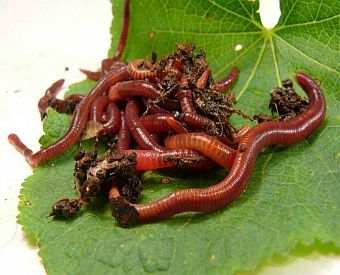Red Wiggler Worms - Vital for Healthy and Effective Gardens
Red Wiggler Worms - Vital for Healthy and Effective Gardens
Blog Article
Red Wiggler Worms Demystified: Unlocking the Secrets of Vermiculture for Greener Living and Nutrient-Rich Soil
In the world of sustainable techniques for enriching soil top quality and promoting eco-conscious living, red wiggler worms play a crucial yet commonly overlooked duty. Red Wiggler Worms. Understanding the details of caring for these worms, maximizing their setting, and harnessing their castings can lead to a greener way of life and healthier soil for plants to thrive.
The Duty of Red Wiggler Worms
Red Wiggler worms play an important duty in composting systems by efficiently breaking down organic matter right into nutrient-rich castings. These ravenous eaters eat a range of natural products, such as kitchen scraps, yard waste, and paper products. As they feed, the worms' digestive system processes break down the raw material into a penalty, dark, and nutrient-dense material called worm spreadings or vermicompost.
The castings created by Red Wiggler worms are extremely advantageous for soil wellness and plant development. They are abundant in vital nutrients like nitrogen, phosphorus, and potassium, which are essential for sustaining healthy plant development. Furthermore, worm spreadings include beneficial microbes and enzymes that aid boost soil framework, increase water retention, and boost nutrient uptake by plants.
Benefits of Vermicomposting

Additionally, vermicompost, the nutrient-rich output of vermicomposting, works as an exceptional organic fertilizer and dirt conditioner. It boosts dirt framework, improves dirt aeration, and increases soil moisture retention. These buildings add to healthier plants with more powerful root systems and better resistance to parasites and diseases. Vermicompost likewise enriches the soil with crucial nutrients like phosphorus, potassium, and nitrogen, advertising plant growth and general soil fertility.
Additionally, vermicomposting assistances sustainable horticulture methods by providing a natural and chemical-free alternative to synthetic fertilizers. Red Wiggler Worms. This ecologically pleasant strategy not only enriches the soil yet likewise helps in reducing dependence on harmful chemicals, promoting a greener and much more sustainable means of horticulture
Setting Up a Worm Container
When establishing a worm bin for vermicomposting, proper setup is important to make certain the success of the composting process. The very first step in establishing a worm container is selecting an appropriate container. This can be a plastic bin or wooden box that supplies sufficient room for the worms to move and has proper drainage holes to stop waterlogging. Next, a bedding material such as shredded newspaper, cardboard, or coconut coir need to be contributed to the container. This bedding offers a comfy environment for the worms and aids keep wetness degrees.
After including the bed linens, present the red wiggler worms to the bin. It is advised to begin with a little number of worms and slowly raise as they multiply. The worms need hop over to these guys to after that be supplied with food scraps such as fruit and vegetable peels, coffee grounds, and eggshells. It is important to avoid adding meat, dairy, oily, or salty foods to avoid attracting bugs and developing unpleasant odors.
Consistently monitor the dampness levels and temperature level in the worm container to make sure optimum problems for the worms. With correct setup and upkeep, the worm bin will properly convert organic waste right into nutrient-rich compost for your plants and garden.
Harvesting Worm Castings
To successfully collect nutrient-rich worm castings from your vermicomposting system, a systematic harvesting method is crucial. When it comes time to gather the worm castings, there are a few crucial steps to comply with to make sure an effective process.

Troubleshooting Common Issues
Recognizing and dealing with usual obstacles that may emerge throughout the vermicomposting process is essential for preserving a healthy and balanced and productive worm bin. Adding excess food scraps can lead to a build-up of wetness and acidity in the worm bin, potentially harming the worms. Another problem is undesirable odors rising from the worm container.
In addition, if the worm population is decreasing or the worms show up undesirable, maybe due to environmental stressors such as extreme temperature levels or pH degrees. Keeping an eye on these elements and making required modifications is essential for the wellness of the worms. By repairing these common problems without delay, vermicomposters can make sure a successful and smooth vermicomposting procedure while maintaining a growing worm visit this page populace.

Verdict
In conclusion, red wiggler worms play an important function in vermiculture by breaking down natural issue into nutrient-rich soil. Establishing up a worm bin is crucial for successful vermiculture, and collecting worm spreadings supplies beneficial compost for horticulture.
As they feed, the worms' gastrointestinal procedures damage down the organic matter right click here now into a fine, dark, and nutrient-dense material understood as worm castings or vermicompost.
The castings created by Red Wiggler worms are extremely beneficial for soil health and wellness and plant growth. Including excess food scraps can lead to a buildup of moisture and level of acidity in the worm bin, potentially damaging the worms.In addition, if the worm population is decreasing or the worms appear unhealthy, it can be due to environmental stressors such as extreme temperature levels or pH degrees. Setting up a worm container is crucial for effective vermiculture, and harvesting worm spreadings provides useful compost for gardening.
Report this page